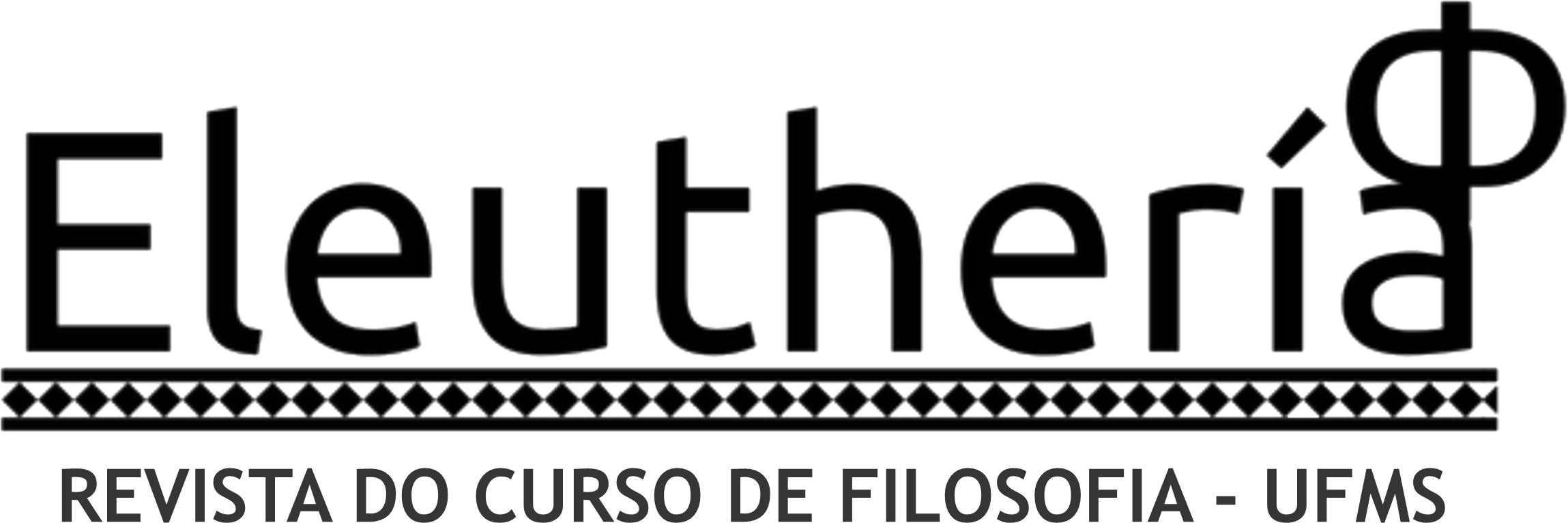LES SIGNES DU PÂRTIR: une anthropologie clinique négro-africaines des marges entre croyances et psychanalyse
Vol. 06, N. 10 (2021) • Eleuthería - Revista do Curso de Filosofia da UFMS
Autor: David-Le-Duc Tiaha
Resumo:
La démarche de l’interprétation des signes du pâtir dans le contexte d’une anthropologie clinique des marges s’organise en quatre étapes. D’abord, la recherche d’une complémentarité des arts de soigner, promue autour des travaux d’Eric de Rosny et de M. P. Hebga, est porteuse d’une théodicée implicite plus soucieuse de justifier la réalité de croyance et sa vérité métaphysique que d’expliciter son intelligence thérapeutique au service de la relation psychothérapeutique. Ensuite, une critique sociale des ambiguïtés de la coalition des rationalités et des croyances contre le Mal de J. Tonda dénonce l’idéologie de la domination à l’œuvre dans la rivalité des diverses pratiques thérapeutiques aussi, les critiques herméneutique et psychanalytique de l’épistémologie des maladies paranormales décrivent les modalités de confusion ou de coïncidence entre l’imaginaire, le réel et le symbolique qu’elle véhicule dans son interprétation des récits de maladies paranormales dissociée de la psychopathologie du marginal pour ensuite en proposer des critères épistémologique et psychanalytique de leur distinction grâce à la théorie des genres littéraires à l’œuvre dans les autobiographies d’affliction : le récit et la métaphore. Enfin, cette clarification herméneutique et psychanalytique ouvre la voie pour une poétique dans l’institution de la psychothérapie comme déplacement de la position du Muntu comme sujet dans un questionnement réciproque entre thérapies traditionnelles, exorcisme et psychanalyse.
Abstract:
The subterranean ramifications of a culture are manifested when its subjects in crisis, in suffering, let out of them the strange, what M. de Certeau calls the figures of the Other, that this culture wants to exorcise in the midst of it. In their therapeutic journey, where suffering has taken the form of acute anxiety, anguish and indeterminacy for them, patients in Africa hold to the symbolic function of care characterized by the dialectical transversality of the disease and healing during their therapeutic route between Western medicine - scientific and technical, traditional African therapies and religious rites. The Muntu Crisis is a philosophical critique of the African or Afro-descendant subject confronted with wonderings in its authentic quest for meaning and being oneself in the face of the symbolic violence of the West's colonial intrusion into Africa. How do you heal others in order to be yourself? The possession crisis is that type of pathological experience of conflicting interpretations revealing the metamorphoses of the mental and cultural universe underway in African societies. The philosophical approach to the interpretation of the signs of the undergo in the context of a clinical anthropology of the margins opens the way for a poetics in the institution of psychotherapy as a displacement of the position of the Muntu as a subject in his relation to the Other through a reciprocal questioning between traditional therapies, exorcism and psychoanalysis around the mesh of the imaginary, the symbolic and the real where religion, magic.
ISSN: 2527-1393
Texto Completo: https://periodicos.ufms.br/index.php/reveleu/article/view/13079
Palavras-Chave: Pârtir. Imaginaire. Symbolique. Réalité. Position subjective.

Eleuthería - Revista do Curso de Filosofia da UFMS
A Revista Eleuthería é um periódico científico vinculado ao Curso de Filosofia da Universidade Federal de Mato Grosso do Sul. A revista tem como propósito o incentivo ao debate científico e à investigação na área de filosofia moderna e contemporânea em seus diversos aspectos e linhas de pesquisa, prestando-se como um instrumento de divulgação do conhecimento e colaborando com o processo de informação, inserção política e cultura e a manutenção de intercâmbio acadêmico.
Neste intuito, a revista abre espaço para o debate qualificado em filosofia nos seus diversos temas e questões voltados à Filosofia Moderna e Contemporânea, a fim de receber diversos artigos de pesquisadores e pesquisadoras do Brasil e de outras partes do mundo. A revista receberá em fluxo contínuo artigos inéditos em filosofia ou áreas afins e os artigos poderão ser enviados em língua portuguesa, inglesa, francesa, italiana e alemã. Além de artigos, o periódico publica resenhas, entrevistas e traduções originais.
